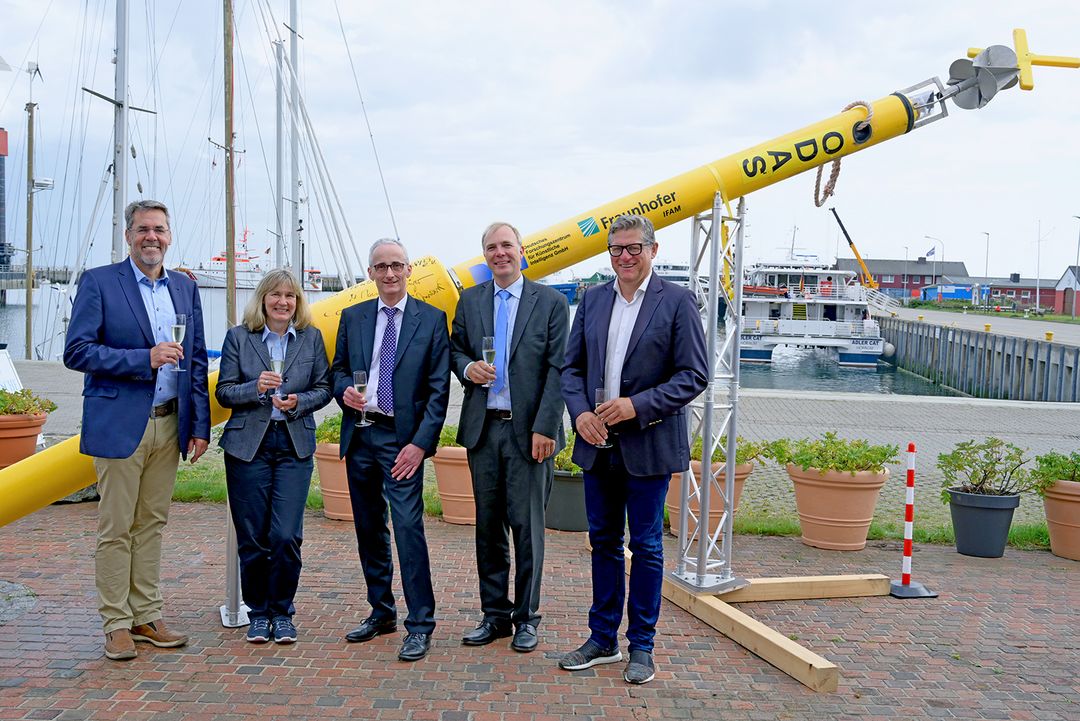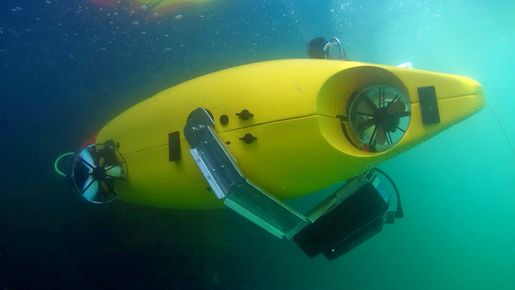The maritime economy is one of the most important industrial sectors not only in Bremen and its neighbouring states in Northern Germany, but also in the whole federation. This powerful trade is secured and developed by products and services of the highest quality. High requirements for reliability and the changes brought upon by the digitalisation create a big challenge for the maritime sectors. Experiments and long-term tests are necessary in order to fulfil these demands. The open sea island of Heligoland offers the best conditions: The harsh offshore climate off the North Sea island is perfectly suitable for the testing of new maritime technologies. Joerg Singer, Mayor of Heligoland, says: "Heligoland is the world's first offshore wind energy service island in the North Sea. The current and future developments fit perfectly with the existing activities and emphasise the attractiveness of Heligoland as a real-life laboratory for the development of future technologies."
Surface and underwater robots in realistic conditions
The Fraunhofer Institute for Manufacturing Technology and Advanced Materials (IFAM) and the German Research Institute for Artificial Intelligence (DFKI) complement each other in their research focuses, aiming for the development and testing of complex robotic systems that operate autonomously and intelligently under water, on the water surface and in the air. The systems are meant to be able to carry out inspections, maintainance and repair works on the high seas in order to relieve people from these dangerous tasks. For the fulfilment of this broad spectre of tasks, the aircrafts and water vehicles have to be equipped with efficient electric motors, a vast range of sensors, technology for the collection and the analysis of sensor data as well as the required algorithms for the autonomous performance of complex missions. The main objective of the joint development works is the proof of reliability of the hardware and software under realistic conditions.
Testing area offers 45 meters of draught for maritime robotics
Apart from the logistics on the island, the test centre for maritime technologies consists of a testing area just off the island, offering plenty of space for different kinds of testing scenarios with a surface area of several square kilometers and a draught of up to 45 meters. The marking of the area for ships with bright yellow buoys is scheduled for spring 2020. During the opening celebrations, the first buoy was symbolically "baptised" by representatives of science, industry and politics. The two institute directors of the Fraunhofer IFAM, Prof. Dr.-Ing. Matthias Busse and Prof. Dr. Bernd Mayer, share the opinion that the test centre is a great addition to the long-lasting research activities on corrosion and vegetation protection of the institute on Heligoland island. Especially new topics such as the electrification of ship propulsion, the reliability and efficiency of motor systems for underwater vehicles and the electrical energy storage systems for surface and underwater application gain in importance.
Leif Christensen, Team Leader for Maritime Robotics of the DFKI Robotics Innovation Center, is convinced: "Artificial intelligence and robustness are the core functions of underwater robotics. With these systems, it will be possible to sustainably cultivate maritime ressources, maintain security and reliability of maritime energy production and ensure a focused, long-lasting investigation of maritime environments. This research area will allow us to develope laboratory prototypes into applicable products and add them to the value chain. This will create new questions and problems for science, providing an important contribution to the enhancement of artificial intelligence."
Maritime research as a driver of innovation and business development
The project receives support from the city of Bremen. Dr. Heide Ahrens, Head of the Division for Universities and Research of the Department of Science, underlines that the Free and Hanseatic City of Bremen with its two cities Bremen and Bremerhaven is an important industry and science location for the maritime sector. "The maritime economy of the state delivers high-tech products for shipbuilding, the harbours, the marine and the offshore industry, including the offshore wind energy. With their large number of value chains at the intersection of industry and services, they play an important role in the regional economy. In cooperation with research institutes, we plan to reinforce the strengths of the maritime economy and highten its importance in a maritime Europe. Working intensively with the science sector, new innovative and intelligent products will be developed and put on the market", Heide Ahrens sums up the position of the Department of Economy and Science.
The plans for a first project in the test centre already exist: In a publicly funded project, a new formation procedure for support structures of offshore wind turbines will be tested in cooperation with an industrial consortium led by the company Vallourec Deutschland GmbH. The steel structure created for the project in the test area will additionally be made accessible as a test specimen and platform for further users.
Furthermore, companies looking for suitable testing conditions for the development of robust and reliable systems can use the know-how and the range of services of the test centre for maritime technologies. The centre offers the planning, conduct and evaluation of application-oriented performance assessments in the testing area. In addition, experienced technicians provide their services in the areas of logistics, engineering, workshop and control station management.
Contact Fraunhofer IFAM:
Dr. Hanno Schnars
Head of the Business Area of Maritime Technologies
Fraunhofer Institute for Manufacturing Technology and Advanced Materials IFAM
Wiener Straße 12 | 28359 Bremen | Germany
Phone: + 49 421 2246 7378 | Fax: -430
hanno.schnars@ifam.fraunhofer.de
Contact DFKI:
Dipl.-Ing. Christopher Gaudig
Deputy Team Leader for Maritime Robotics
German Research Center for Artificial Intelligence (DFKI)
Robotics Innovation Center
Robert-Hooke-Str. 1 | 28359 Bremen
Phone: +49 421 17845-4119
christopher.gaudig@dfki.de
Press contact DFKI:
German Research Center for Artificial Intelligence (DFKI)
Corporate Communications Bremen
uk-hb@dfki.de
Phone: +49 421 178 45 4180


